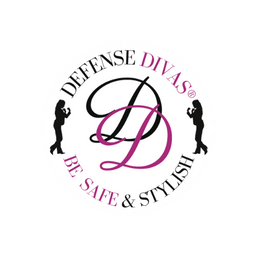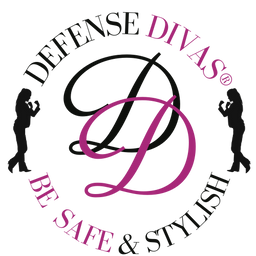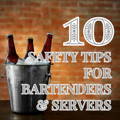“Staying vigilant and aware is your first line of self-defense."
Ten Safety Tips for Bartenders and Servers
Working in the service industry comes with its’ risks and rewards. The opportunity to make big bank in tips can sometimes cause us to find ourselves in less than safe work situations. Closing late. Closing alone. Dealing with drunks. Walking to your car at night. All of these come with the territory of working in the bartending industry but you can dramatically reduce your risk of harm by following these safety tips.
1. Always Maintain Situational Awareness
Being aware of your surroundings is crucial for your safety as well as the customers in your bar. Keep an eye on what's happening around you and don’t get too distracted talking to one patron. This pulls your focus to one conversation and you need 360-degree awareness of what’s happening around you.
Notice who enters and leaves the premises, and pay attention to customers’ behaviors and body language. If something feels off or makes you uncomfortable, trust your instincts and take action. Alert a manager or co-worker if you notice anything suspicious, and always have a plan for what to do in case of an emergency.

2. Deploy De-Escalation Tactics When Necessary
Knowing how to calm a tense situation can prevent conflicts from escalating. If a customer becomes aggressive or starts causing trouble, stay calm and composed. Speak in a steady, soothing voice, and use non-threatening body language. Avoid arguing or raising your voice, as this can make the situation worse. Instead, try to understand the person's concerns and address them calmly. If needed, call for backup from a manager or security personnel.
To learn more about understanding body language and de-escalation techniques for aggression, please read our article: 'The Body Language of Aggression'.
3. Set Polite Boundaries With Intoxicated Patrons
Practice a few polite but clear boundary setting things to say to an overly-friendly, intoxicated customer beforehand. Having these comebacks already in your mind will make the situation less awkward, establish your boundaries and hopefully not affect your tip in a negative way. Of course, if their behavior continues, you should call security for assistance.

4. Communication is Key with Co-Workers
Keep the lines of communication open and running back and forth with other co-workers on your shift. Share information about any potential risks or incidents. Establish a system for discreetly signaling for help if you’re in trouble, such as using specific phrases or hand signals.
Ensure everyone knows the emergency procedures and who to contact in different situations. By working together and staying informed, you can better protect each other.
5. Take a Self-Defense Class
Learning self-defense techniques can boost your confidence and prepare you for unexpected situations. Look for classes that teach practical skills for real-life scenarios. Many community centers, gyms, and specialized studios offer self-defense courses. Some employers may even sponsor or reimburse the cost of the class. Practicing these techniques regularly can help you react quickly and effectively if you ever need to defend yourself.
To learn more about self-defense classes, read our article 'How to Choose a Self-Defense Class'.
“Learn de-escalation tactics and deploy them when necessary.”
6. Carry a Self-Defense Device
Carrying a self-defense device, such as pepper spray or a stunning gun, can provide an extra layer of security. Make sure you understand how to use it properly and check your workplace’s policies on such items.
Always keep your stun gun easily accessible, and practice using it so you can react quickly in an emergency. You want it to be second nature even if you are panicked.
Stun guns should be charged monthly to maintain optimal performance. Just like any other battery, its’ power deteriorates when not used. Set a monthly reminder to recharge your stun weapon and it will be at peak performance when you need it most. Remember, while non-lethal, these self-defense weapons are for protection and should be used responsibly.
If you are caught off guard by an attacker and do not have your personal defense weapon behind the bar, remember where you are! There are tons of sharp objects, from knives and forks to glass bottles, that you can use to defend yourself.

7. Have an Active Shooter Plan in Place
It is the unfortunate fact of the times we live in that anyone who works with the public must be prepared for a possible active shooter emergency in their business. If your employer has an active shooter plan, review it monthly with staff members so that it remains fresh in their minds when a crisis occurs. If your employer does not have an active shooter plan developed for employees, it is crucial that one be drawn up immediately. You can begin with this article: 'How to Survive an Active Shooter Crisis'.
8. Post Emergency Contacts in Several Places
Having emergency contact information readily available is critical. Post a list of important phone numbers, such as local police, security services, and management, in multiple locations around your workplace. Ensure that everyone knows where to find these numbers, both in public areas and more private staff-only spaces. In an emergency, quick access to this information can make a significant difference.

9. Lock It Down at Closing Time
Of course you lock the front door at closing time, but also be sure to check other doors and windows are locked too. Make it a routine to check all entry points before you finish your shift. Politely inform customers when it’s time to leave, and don’t hesitate to ask for help if someone refuses to go. If possible, clean up and finish closing tasks while there are still other people around to avoid being alone.
With that being said, “regulars” who are safe and trusted may actually be a benefit at closing time. Allowing these trusted patrons to stick around and finish their drink while you close can be a deterrent to someone with criminal intentions. Bonus points if they walk you to your car and make sure you leave work safely.

10. Never Close Alone
Arrange your shift schedule so that you close with another co-worker. If that’s not possible, ask a friend or family member to be there with you. Having someone else with you not only provides additional security but also ensures that there’s help available in case of an emergency. If you absolutely must close alone, keep in constant communication with someone you trust until you are safely out of the building and on your way home.
In conclusion, situational awareness is your first line of defense in ensuring your safety at work. By staying alert and attentive to your surroundings, you can identify potential risks before they escalate and take proactive steps to protect yourself.
Combine this vigilance with effective communication, de-escalation tactics, self-defense training, and the proper use of self-defense tools to create a comprehensive personal safety plan. Stay aware, stay prepared, and stay safe.
Defense Divas® wants you to be equipped to defend yourself not only with a self-defense weapon, but also with the practical knowledge of safety awareness and prevention.
Follow us on your favorite social media platforms (@DefenseDivas) to receive safety tips, product videos and more in your daily feed. Leave us a comment and introduce yourself too!
Copyright©2024 All rights reserved. This article or any portion thereof may not be reproduced or used in any manner whatsoever without the express written permission of Defense Divas®.



